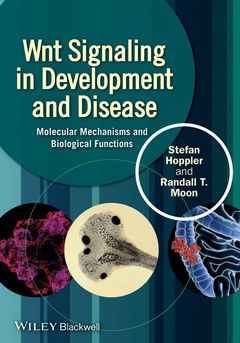Wnt Signaling in Development and Disease Molecular Mechanisms and Biological Functions
Auteurs : Hoppler Stefan P., Moon Randall T.

? A definitive source of information on Wnt signaling and its role in development and disease, written by leaders in the field.
? Explores the role of Wnt signaling in chronic disease such as melanoma, colorectal cancer, dementia, and psychiatric diseases
? Reviews the complex processes of signal integration and regulation
? Features broad discussion of Wnt signaling biology as well as detailed discussion of the pathway?s role in diseases and potential clinical applications.
Contributors vii
Preface xi
Part 1 Molecular Signaling Mechanisms: From Pathways to Networks 1
1 Wnt Signal Production, Secretion, and Diffusion 3
Madelon M. Maurice and Hendrik C. Korswagen
2 Wnt Signaling at the Membrane 15
Gary Davidson and Christof Niehrs
3 Wnt Signal Transduction in the Cytoplasm: an Introduction to the Destruction Complex 33
Tony W. Chen, Heather A. Wallace, Yashi Ahmed, and Ethan Lee
4 An Overview of Gene Regulation by Wnt/β-Catenin Signaling 51
Chen U. Zhang and Ken M. Cadigan
5 Finding a Needle in a Genomic Haystack: Genome-Wide Approaches to Identify Wnt/TCF Transcriptional Targets 73
Chandan Bhambhani and Ken M. Cadigan
6 Introduction to β-Catenin-Independent Wnt Signaling Pathways 89
Susanne Kühl and Michael Kühl
7 Molecular Mechanisms of Wnt Pathway Specificity 101
Alexandra Schambony, Guido J.R. Zaman, and Folkert Verkaar
8 Modulation of Wnt Signaling by Endocytosis of Receptor Complexes 113
Akira Kikuchi, Shinji Matsumoto, Katsumi Fumoto, and Akira Sato
9 New Insights from Proteomic Analysis of Wnt Signaling 125
Matthew P. Walker, Dennis Goldfarb, and Michael B. Major
10 New Insights about Wnt/β-Catenin Pathway Mechanisms from Global siRNA Screens 137
Tenzin Gocha and Ramanuj DasGupta
11 Mathematical Models of Wnt Signaling Pathways 153
Michael Kühl, Barbara Kracher, Alexander Groß, and Hans A. Kestler
12 The Wnt’s Tale: On the Evolution of a Signaling Pathway 161
Jenifer C. Croce and Thomas W. Holstein
Part 2 Selected Key Molecules in Wnt Signaling 177
13 Secreted Wnt Inhibitors or Modulators 179
Paola Bovolenta, Anne-Kathrin Gorny, Pilar Esteve, and Herbert Steinbeisser
14 Frizzleds as G Protein-Coupled Receptors 195
Gunnar Schulte
15 Dishevelled at the Crossroads of Pathways 207
Vítìzslav Bryja and Ondøej Bernatík
16 β-Catenin: a Key Player in Both Cell Adhesion and Wnt Signaling 217
Jonathan Pettitt
17 Evolutionary Diversification of Vertebrate TCF/LEF Structure, Function, and Regulation 225
Stefan Hoppler and Marian L. Waterman
18 Insights from Structural Analysis of Protein–Protein Interactions by Wnt Pathway Components and Functional Multiprotein Complex Formation 239
Zhihong Cheng and Wenqing Xu
Part 3 Wnt Signaling in Embryonic Development and Adult Tissue Homeostasis 251
19 Wnt Signaling in Early Vertebrate Development: From Fertilization to Gastrulation 253
Eliza Zylkiewicz, Sergei Y. Sokol, and Stefan Hoppler
20 Wnt/β-Catenin Signaling in Embryonic Stem Cells: Insights into Early Mammalian Development 267
Kathryn C. Davidson
21 Wnt Signaling in Neural Development 279
Richard I. Dorsky
22 Wnt Signaling in Heart Organogenesis 293
Stefan Hoppler, Silvia Mazzotta, and Michael Kühl
23 Wnt Signaling in Kidney Organogenesis 303
Kimmo Halt and Seppo Vainio
24 Wnt Signaling Regulation of Tissue Architecture (EMT and MET) and Morphogenesis: Consequences for Colorectal and Liver Cancer 315
Theodora Fifis, Bang M. Tran, Renate H.M. Schwab, Timothy M. Johanson, Nadia Warner, Nick Barker, and Elizabeth Vincan
25 Wnt Signaling in Adult Stem Cells: Tissue Homeostasis and Regeneration 329
Frank J.T. Staal and Riccardo Fodde
26 Restoring Tissue Homeostasis: Wnt Signaling in Tissue Regeneration After Acute Injury 339
Günes Özhan and Gilbert Weidinger
Part 4 Wnt Signaling in Chronic Disease 357
27 Wnt Signaling and Colorectal Cancer 359
Kevin Myant and Owen J. Sansom
28 Wnt Signaling in Melanoma 369
Jamie N. Anastas and Andy J. Chien
29 Wnt Signaling in Mood and Psychotic Disorders 379
Stephen J. Haggarty, Karun Singh, Roy H. Perlis, and Rakesh Karmacharya
30 Neuropsychiatric Disease-Associated Genetic Variation in the Wnt Pathway 393
Stephen J. Haggarty, Karun Singh, Roy H. Perlis, and Rakesh Karmacharya
31 Wnt Signaling in Dementia 411
Stephen J. Haggarty
32 Therapeutic Targeting of the Wnt Signaling Network 421
Felicity Rudge and Trevor Dale
Index 445
Randall T. Moon, PhD, is Professor of Pharmacology at the University of Washington School of Medicine. His lab focuses on identifying the normal roles of Wnt signaling in embryos and adults and applying that knowledge to develop therapies for acute and chronic medical conditions involving Wnt signaling. Dr. Moon is Founding Director of the University of Washington Institute for Stem Cell and Regenerative Medicine, and a member of the Paul Allen Brain Institute Cell Networks Advisory Council, the HHMI Medical Research Fellows Program panel, and College of CSR Reviewers for NIH.
Date de parution : 05-2014
Ouvrage de 472 p.
18.5x26.2 cm



